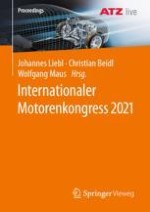2021 | OriginalPaper | Buchkapitel
The road to a low CO2 mobility - New perspectives on the transport and energy transition in Germany
verfasst von : Martin Stahl, Markus Seeberger, José Miguel Escobar Coto
Erschienen in: Internationaler Motorenkongress 2021
Verlag: Springer Fachmedien Wiesbaden
Aktivieren Sie unsere intelligente Suche, um passende Fachinhalte oder Patente zu finden.
Wählen Sie Textabschnitte aus um mit Künstlicher Intelligenz passenden Patente zu finden. powered by
Markieren Sie Textabschnitte, um KI-gestützt weitere passende Inhalte zu finden. powered by
The reduction of CO2 emissions in the transport sector is highly relevant and the subject of intense debate. However, from our point of view, an objective comparison of e-mobility and its alternatives is still outstanding. In this study, we establish a holistic perspective on e-mobility in Germany and examine CO2 effects of electric vehicles. We conclude that electric vehicles are not the optimal contribution to CO2 reduction in the foreseeable future. Depending on the scenario, electric vehicles cause more emissions or save only a relatively small amount of CO2 at prohibitively high abatement costs. Under realistic assumptions (base scenario), e-mobility increases German net CO2 emissions by 40 mn tons until 2030. If best case assumptions for e-mobility are taken (extreme scenario), 95 mn tons of CO2 emissions can be saved (2020- 2030). However, the costs of e-mobility will amount to EUR 47-75 bn until 2030, depending on whether EVs will reach price parity with ICE. Hence, even in the extreme scenario the CO2 abatement costs of EVs are prohibitively high with 400-700 EUR/t CO2 and therefore e-mobility can be questioned as a CO2 saving measure. Hydrogen and synthetic fuels are compared as alternatives based on the assumption that the cost of e-mobility could be used to subsidize hydrogen vehicles, infrastructure, and fuels as well as synthetic fuels. In the case of hydrogen, ~200 mn tons of CO2 emission can be saved until 2030. Synthetic fuels provide an even bigger saving impact and can abate ~600 mn tons of CO2 emissions until 2030. Implementation risks for synthetic fuels are mainly limited to the development of the production infrastructure in sunny regions and the achievement of economies of scale.
